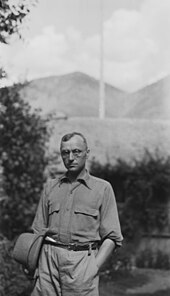Georg Valentin von Munthe af Morgenstierne
Georg Valentin von Munthe af Morgenstierne (born January 2, 1892 in Oslo , † March 3, 1978 in Oslo) was a Norwegian Indo-Iranist . He published under the name Georg Morgenstierne.
Life
Morgenstierne received his doctorate in November 1918 with a treatise on the relationship between Cārudatta and Mṛcchakaṭikā at the Friedrich Wilhelm University in Berlin . Morgenstierne's teachers included Heinrich Lüders , Sten Konow and Wilhelm Schulze .
In 1930 he was appointed professor at the University of Gothenburg . From 1937 until his retirement in 1962, Morgenstierne was Professor of Indian Language and Literature at the University of Oslo .
From the 1920s he made research trips to India, Pakistan, Afghanistan and Iran and published Indological and Iranian studies. Morgenstierne undertook his first field research trip to Afghanistan in 1924; it was supported by the Norwegian Institute for Collective Kulturforskning, founded in 1922 . He researched the diversity of the country's languages, about the structure of which little was known until then. In 1929 he traveled to northwest India, now Pakistan. After the Second World War , several smaller trips to Afghanistan followed, especially Nuristan.
To Morgenstiernes merits include the exploration of dardischen and kafirischen languages that had no written tradition tradition. Morgenstierne collected phonetically reliable records of these language groups and thus created the basis for all further research. He was an advocate of historical phonology and the scientific comparison of languages. He showed that the Dardic languages are of purely Indo-Aryan origin, but the Nuristani languages (then Kafiri languages) cannot be derived from Indian, but represent a separate branch of Indo-Iranian. He thus became a supporter of the hypothesis of the third language branch of the Indo-Iranian language family, which was previously represented by G. A. Grierson (1906). In the form of Morgenstierne, this thesis is generally recognized today, even if some Indo-Europeanists initially met it with skepticism. His assignment of the Dardic languages to Indo-Aryan is also widely accepted today.
Morgenstierne's main work is a monumental collection that appeared from 1929 to 1973 under the title Indo-Iranian Frontier Languages . Morgenstierne published on almost every Iranian language. On his 70th birthday, friends and colleagues dedicated the Indo-Iranica commemorative publication to him .
In 1964 he was elected a corresponding member of the British Academy .
Works
- Indo-Iranian frontier languages. Oslo, Vol. 1, 1929, Vol. 2, 1938, Vol. 3/1, 1967, Vol. 3/2, 1944, Vol. 3/3, 1956, 2nd edition Oslo 1973 with Vol. 4
- Etymological Vocabulary of Pashto . Oslo 1927. Revised by Josef Elfenbein as: A new etymological vocabulary of Pashto , Wiesbaden 2003
- Etymological Vocabulary of the Shughni Group. Wiesbaden 1974
Honors
- Indo-Iranica. Mélanges présentés à Georg Morgenstierne à l'occasion de son 70th anniversaire. Harrassowitz, Wiesbaden 1964 (Festschrift)
literature
- Georg Buddruss: Georg Morgenstierne 1892–1978. In: Afghanistan-Journal , Volume 5, 1978, pp. 109-111
- Nils Johan Ringdal: Georg Valentin von Munthe af Morgenstiernes forunderlige liv og reiser . Oslo 2008. ISBN 978-82-03-18833-6
- Ulf Andenæs: En norsk legende i Orienten . In: Aftenposten , May 22, 2008, p. 10; Retrieved March 12, 2010
- Heiko Uecker : A look back: two Norwegian researchers in Bonn . (PDF) In: dialog. Announcements from the German-Norwegian Society e. V., Bonn , No. 46, 2015, pp. 56–57, (Georg Valentin von Munthe af Morgenstierne and Christian Lassen )
- Brief portrait of the National Library of Norway, accessed March 12, 2010
Web links
- Literature by and about Georg Valentin von Munthe af Morgenstierne in the catalog of the German National Library
- Evidence in BIBSYS
Individual evidence
- ↑ George Buddruss: Georg Morgienstierne 1892-1978. In: Afghanistan-Journal , Volume 5, 1978, p. 110
- ^ Deceased Fellows. British Academy, accessed July 8, 2020 .
| personal data | |
|---|---|
| SURNAME | Munthe af Morgenstierne, Georg Valentin von |
| ALTERNATIVE NAMES | Morgenstierne, Georg |
| BRIEF DESCRIPTION | Norwegian linguist |
| DATE OF BIRTH | January 2, 1892 |
| PLACE OF BIRTH | Oslo |
| DATE OF DEATH | March 3, 1978 |
| Place of death | Oslo |
